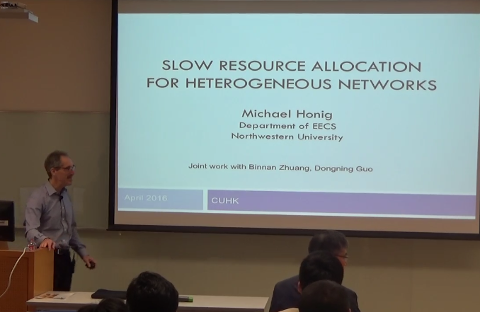
The evolution of cellular networks from 4G to 5G will be characterized by substantial increases in cell density and heterogeneity. Current methods for allocating bandwidth and users to Access Points (APs) do not fully account for such heterogeneity and the associated variations in traffic across space and time. We consider joint allocation of bandwidth across APs and user-AP assignments over a slow timescale in which traffic intensities vary across the network, but are assumed to be constant over time. An optimization framework is proposed with average packet sojourn time as the system objective, where the service rates (spectral efficiencies) are determined from reuse patterns and average channel conditions. Simulations demonstrate substantial gains relative to benchmark schemes (orthogonal and full-frequency reuse). An extension of the framework that penalizes energy consumption will be presented along with an approach to facilitate scalability.
Joint work with Binnan Zhuang and Dongning Guo.
Michael L. Honig is a Professor in the Department of Electrical Engineering and Computer Science at Northwestern University. Prior to joining Northwestern he worked in the Systems Principles Research Division at Bellcore in Morristown, NJ, and at Bell Laboratories in Holmdel, NJ. He received the B.S. degree in electrical engineering from Stanford University in 1977, and the M.S. and Ph.D. degrees in electrical engineering from the University of California, Berkeley, in 1981. He has held visiting scholar positions at the Naval Research Laboratory (San Diego), the University of California, Berkeley, the University of Sydney, Princeton University, and the Technical University of Munich. Dr. Honig has served as editor and guest editor for several journals, and as a member of the of the Board of Governors for the IEEE Information Theory Society. He is a Fellow of IEEE, the recipient of a Humboldt Research Award for Senior U.S. Scientists, and the co-recipient of the 2002 IEEE Communications Society and Information Theory Society Joint Paper Award and the 2010 IEEE Marconi Prize Paper Award.
